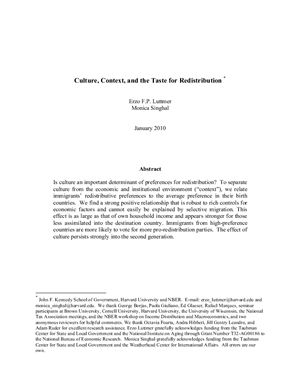Web-paper
January 2010
Abstract
Is culture an important determinant of preferences for redistribution? To separate culture from the economic and institutional environment (context), we relate immigrants’ redistributive preferences to the average preference in their birth countries. We find a strong positive relationship that is robust to rich controls for economic factors and cannot easily be explained by selective migration. This effect is as large as that of own household income and appears stronger for those less assimilated into the destination country. Immigrants from high-preference countries are more likely to vote for more pro-redistribution parties. The effect of culture persists strongly into the second generation.
January 2010
Abstract
Is culture an important determinant of preferences for redistribution? To separate culture from the economic and institutional environment (context), we relate immigrants’ redistributive preferences to the average preference in their birth countries. We find a strong positive relationship that is robust to rich controls for economic factors and cannot easily be explained by selective migration. This effect is as large as that of own household income and appears stronger for those less assimilated into the destination country. Immigrants from high-preference countries are more likely to vote for more pro-redistribution parties. The effect of culture persists strongly into the second generation.

